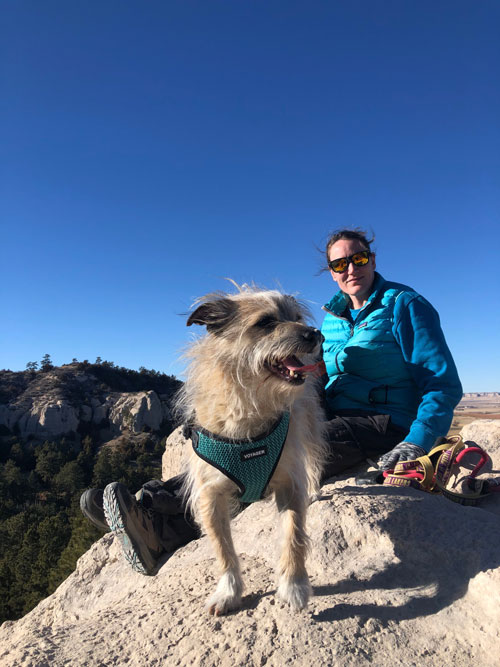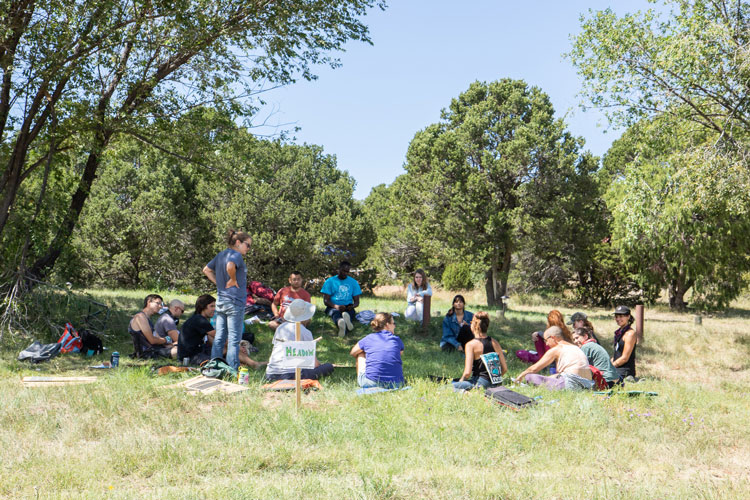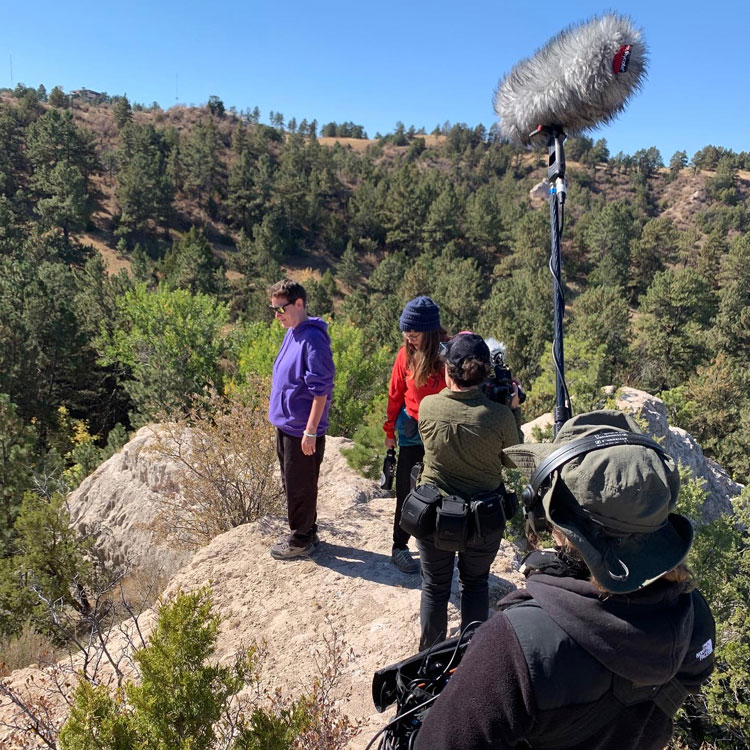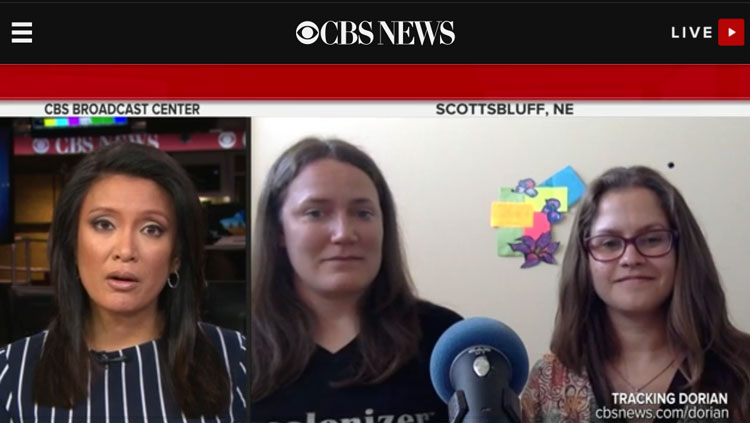Alumni Spotlight: LaUra Schmidt

LaUra (she/her), a 2014 Environmental Humanities graduate, is a truth-seeker, community-builder, cultural critic, and grief worker. She is also the granddaughter of a holocaust survivor. Inspiration finds her in natural landscapes and honest, open-hearted dialogue. She is the founding director of the Good Grief Network and has been studying and cultivating personal and collective resilience strategies for nearly a decade. She is trained in nonviolent civil disobedience and is a Climate Reality Leadership Corps member and mentor. LaUra, and her wife Aimee Lewis Reau, have written a book on their unique 10-Step program they run through Good Grief Network, which is expected out Spring 2023 through Shambhala Publications. A documentary about their work is also currently being made with an anticipated release date of Spring 2023. Their work has received wide attention in national media, including major outlets such as The New York Times, The Washington Post, Time Magazine, and NBC News.
In November, I spoke with LaUra about the Good Grief Network, how EH shaped her work, and her thoughts on hope in the context of the recent UN climate talks.
Brooke: What has your journey looked like since you graduated from the Environmental Humanities Program?
LaUra: I think my path, like many people's paths, has been meandering. After graduating, I worked for a small environmental nonprofit in Salt Lake City for a number of years, and then I realized how slow political change was and it was driving me bananas. I had done a lot of work for my graduate thesis to figure out ways to sustain myself as a changemaker but the political change just wasn’t happening fast enough. I approached my now wife, Aimee Lewis Reau, to build a program with me and take the theoretical framework from my graduate thesis into real life and practice with people. We created Good Grief Network five years ago and now sit with people all over the world who are wanting to look the climate crisis and overlapping crises in the face, and not fold or crumble, but rather develop some resilience strategies so that we can keep being changemakers.

A Good Grief session at the 2018 Uplift Climate Convergence.
Brooke: When I returned to Utah in 2016, I went to one of your early Good Grief sessions. It was a wonderful way to come into this community, so thank you for welcoming me and holding that space. What does your work look like with the Good Grief Network now?
LaUra: We create community groups, most of them are digital right now because of the pandemic, but we bring people together to lean into the painful feelings over the state of the world and try to identify meaningful action. That's kind of our mission statement. But what it looks like on the ground is that we have a 10-step process where we meet once a week, and we discuss a different topic (step). We've blended the best available container-making strategies from programs like Adult Children of Alcoholics, which is a spinoff of the typical 12-step AA program, with learning from a variety of healers and facilitators that we sat with throughout our lives. We've been fortunate and gifted by sitting with a lot of people who want to have hard conversations, and we've been able to witness how they navigate those spaces. Each week, in the program, we really dig into the big questions about what it means to be alive in this time and place. We hear from a lot of people that they appreciate the non-judgmental space and the opportunity to show up in authentic ways. There aren't a lot of spaces for that in the dominant culture. The ability to show up authentically connects and transforms people.
Brooke: As we’re having this conversation, COP26 is happening, so climate is getting more international attention in the daily news cycle. How are you seeing, or how are you not seeing, grief in those conversations? What role does grief have in the international climate movement?
LaUra: I've been really moved by the ways that climate justice has shaped the dialogue. Additionally, how the youth are being recognized as folks who are suffering and ought to have a seat at the table, even if they're not of voting age. What I'm feeling and observing is that there's a fresh type of energy arriving and is not going away. Marginalized folks are refusing to be silenced. The youth refuse to be silenced. I think that we're complex enough beings that we can hold the grief of the present moment that we're living in with the activation and excitement that there are whole demographics of people who refuse to remain silent over the climate crisis. We’re not going back. We’re moving forward under new rules and new ways. I think that it's the most optimistic I've been in a long time. Now, if the people in power would listen and actually respond accordingly, that'd be a whole different thing. Which brings us back to the grief over how our systems are set up to prioritize certain voices over other voices and that those prioritized voices aren't the ones that are going to be most directly impacted. I'm holding the tension of the grief and the despair and this new, reenergized activation that we're witnessing.
Brooke: What is the relationship between grief and hope?
LaUra: Hope is an interesting word. Are we hoping that we can continue business as usual? That’s not the kind of hope that I think you, or me, or several of us in this field are looking for. Do we hope for a meaningful future, a connected future? A future where the kids that we care about get the opportunity to grow old? That's the kind of hope that many of the people coming to Good Grief Network want. But it's an illusion to hope that if we ignore the problem long enough, it'll fix itself or just go away and we don’t really have to do anything about it. We in Good Grief Network try to be strategic about how we frame hope. We realize that leaning into feelings like despair and grief, and making room to process them, opens us up to feeling new things and to seeing the world differently. That feels crucial if we're going to find new pathways forward. If we're going to transition, we must see things differently. The way to do that is by honoring our grief, by being friends with our fear and not letting it cripple us or shut us down.

Brooke: You started developing the framework that became the Good Grief Network during your time in the Environmental Humanities Program. What did your research entail? How did that project lead to where you’re at today?
LaUra: It was in the EH program that I came to understand the severity of the predicament. The climate crisis was front and center in much of what we were reading and in the discussions we were having. I realized that there wasn't very much space for processing our emotional reaction over the state of the world. As someone who experienced a lot of childhood trauma, and because of that, lives life with depression and anxiety, the two were not compatible in my life. I can't just keep talking about all the despairing things without having resources or community to help me process it. I also started realizing the interplay between my own personal trauma and the larger systemic traumas that have been going on for hundreds, or thousands, of years. I was beginning to become overwhelmed by all of the fear, helplessness, and grief I was feeling and burning out. And now is not the time to burn out. If you’re an activist, you're always an underdog. You're always going against the status quo. You're always trying to change these systems that seem so big and strong and are entrenched all around us and in all of us. If I wanted to face the dire state of the world and change our systems, I knew I needed more resources. I started looking into the current sociological and psychological research, seeing what they offered in the realm of sustained activism around climate. I also did a number of interviews for my thesis work. I interviewed activists, scientists, professors, and writers who had been working in the climate realm for some time. I asked them how they cared for themselves while doing their work. What strategies do they employ? What kinds of things do they do so they can keep doing the work? Then I uncovered a number of themes, put the themes together in an order that flowed, and then defended my thesis project and graduated.
I set that work aside for a number of years because I got a job with an environmental nonprofit. I then circled back when I experienced the despair and burnout creeping back in as I was working to make policy change with the nonprofit. In the EH program, Terry Tempest Williams taught me about the importance of weaving together the inner and outer work. I had to get back to that. If we do all the activism or advocacy work without our inner work, we're going to burn out. If we do only inner work without outward activism or advocacy work, nothing changes. I'm interested in how we marry the two and then house it within community so that we're supported, and when we need a break, we know there are other people standing up to continue the work that needs to be done. All of that has roots in EH.
Brooke: What advice do you have for current EH students?
LaUra: The best piece of advice that I have is to pursue what brings you alive and do it with courage. We're in a collective time of reimagining the world. We need fresh ideas, inspiration, and idealism. Going into a program like EH is so ripe for these kinds of moments. My time in the program was an exploration of what type of work brings me alive. I learned the importance of leading with passion, meaning, courage, and joy. This is what the world needs right now. And while my work isn’t fully financially stable yet, I think that it's the work that I'm meant to do, and I believe in it wholeheartedly. We get asked a lot in interviews, 'Isn't your work too idealistic?' My response is often, yeah, it is idealistic. But also, if we need new pathways forward, we need idealists to pave those paths. Business as usual is not going to show us new ways to live or help us imagine new pathways. Current systems are not going to teach us how to connect and how to be inspired. We need the idealists for this.
Don’t lose heart while trying to make your passions a profession. When we try to monetize the things that we really love to do, we change that relationship to them, and that changes us. I constantly struggle with identifying the right direction for Good Grief Network if we want it to be in the world as we envisioned it. I ask, do we want to monetize it in these sorts of ways? If folks are going to be courageous, and try to forge a unique path, I suggest being very clear about the priorities and about the aspects of the work that you don't want to sacrifice. Capitalism takes so much from us that you don't want to lose sight of why you're doing your work to begin with. Linking up with people helps too. If you have an idea and you're inspired, there may be other people who want to help you with that idea.
Brooke Larsen: What or who fuels your idealism?
LaUra: The Network, for sure. Sometimes I can convince myself that not enough people care, that I'm the only one that sees the severity of the problems around us. Then I sit in community with other concerned people, and I do it in an open-hearted way, and it just re-engages my creativity and my passions and my hope—to come back to that word—because I realize that I’m not alone. We're just isolated, and if we can remove that isolation and connect with others, there are so many of us who want to change the way that things are going. We're ready, we just need some direction, we need some motivation. We need vision. The people that I'm looking to for inspiration are Joanna Macy, always. And, Francis Weller. I’m also learning a lot from adrienne maree brown, Prentis Hemphill, and Staci Haines, who are exploring the intersections of embodiment, social justice, and the climate crisis. These are not independent problems, like so many of us have been taught that they are, they're intersectional and impact us on so many different levels. How we treat our bodies, how we treat other people, how we treat Earth, it's all implicated in this larger predicament. We need to dig deep enough to uncover what's creating this sort of disconnection to begin with.

LaUra and Aimee being interviewed about the Good Grief Network on CBS News.
Brooke: Your work has received a lot of recognition from national media. A book and documentary about your work will come out in 2023. How does it feel to receive that recognition?
LaUra: I grew up in a rural village in Michigan with two abusive parents and pretty much raised myself since I was 12. I have worked really hard to put something generative and beautiful into the world and others are benefiting from it. People telling me that my work has changed their lives is the biggest gift and the biggest reward. I couldn't have even imagined it a few years ago. I am constantly humbled by the notion that people want to hear what I have to say, and that folks want to relate in authentic and courageous ways. There are so many of us that want to build a better world. A lot of the media don't exactly get what we do, so I have to be a bit strategic in how I talk to them. But it's still a fun experience. Good Grief Network was just mentioned in a TIME Magazine article last week. That's huge. I was just poor kid from rural Michigan, you know?
